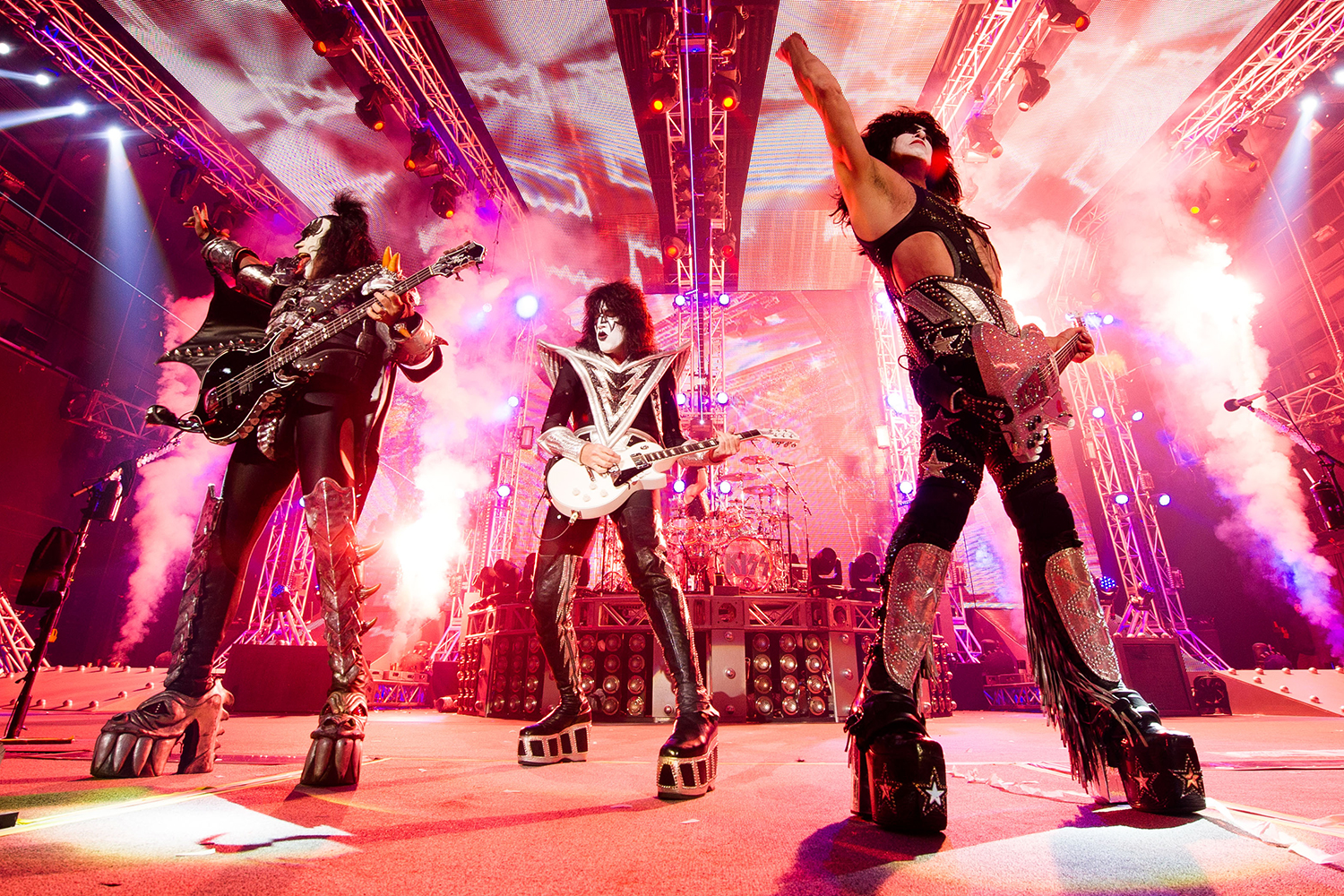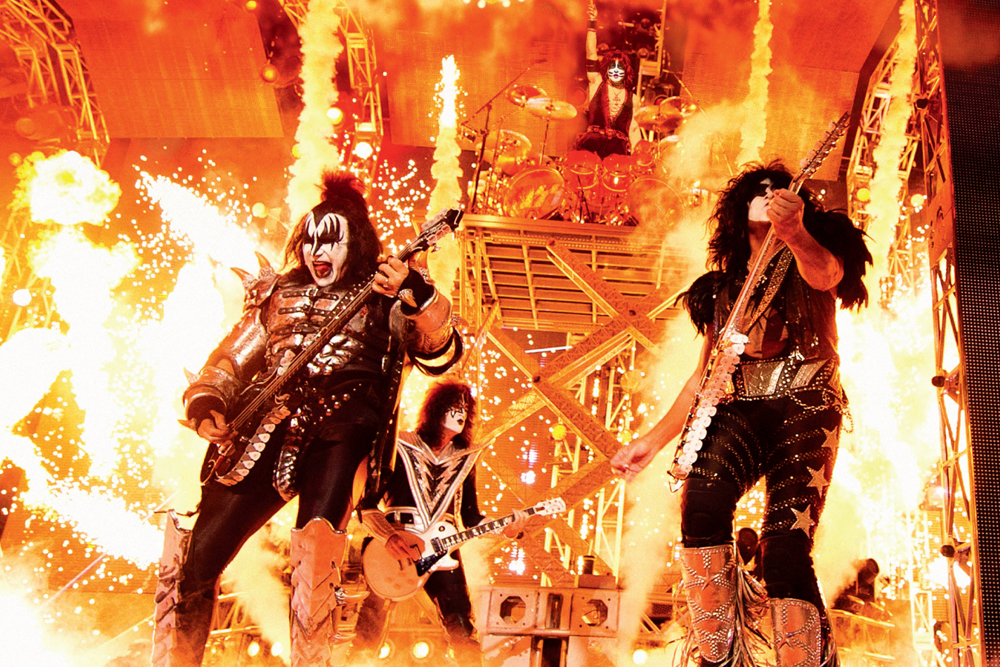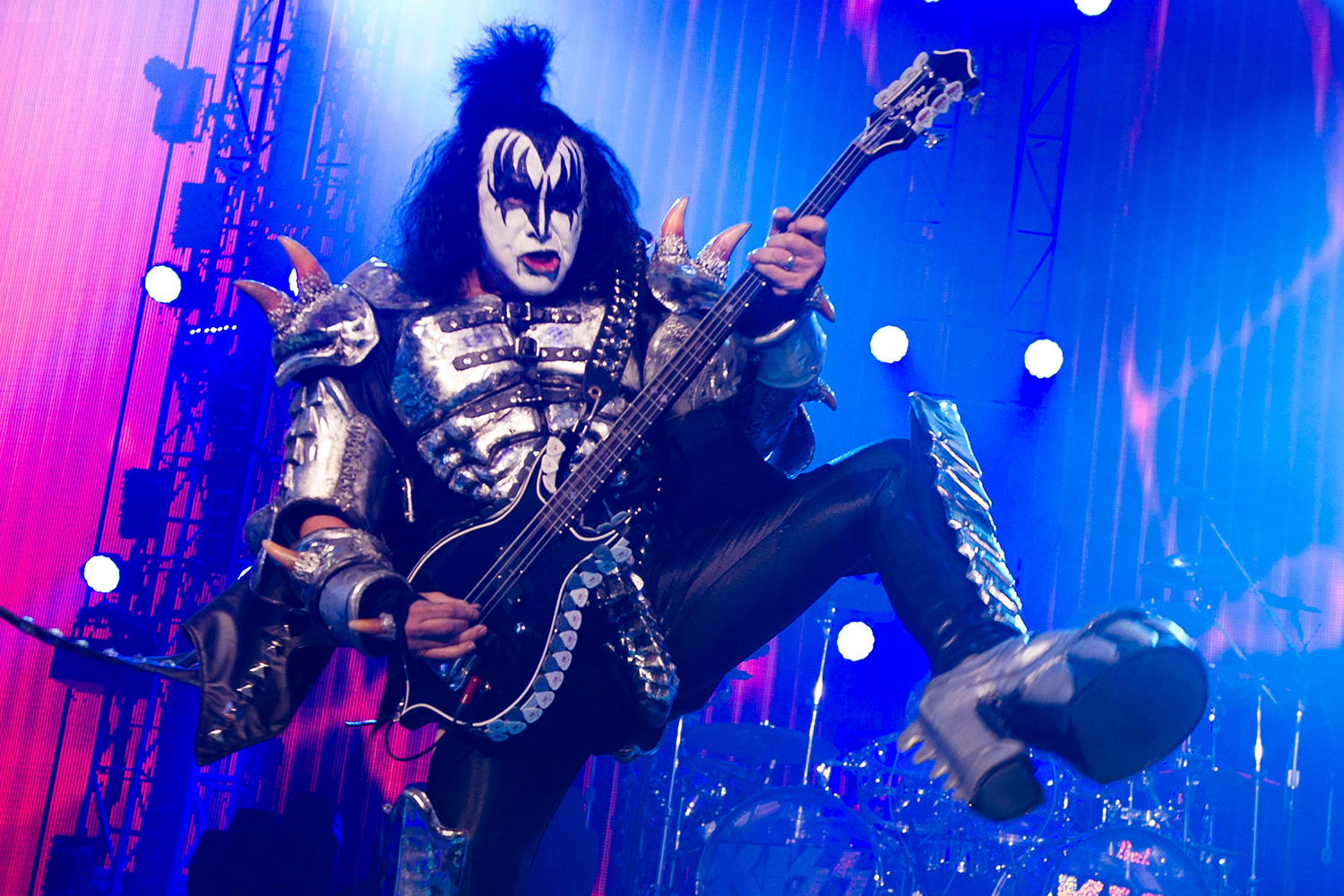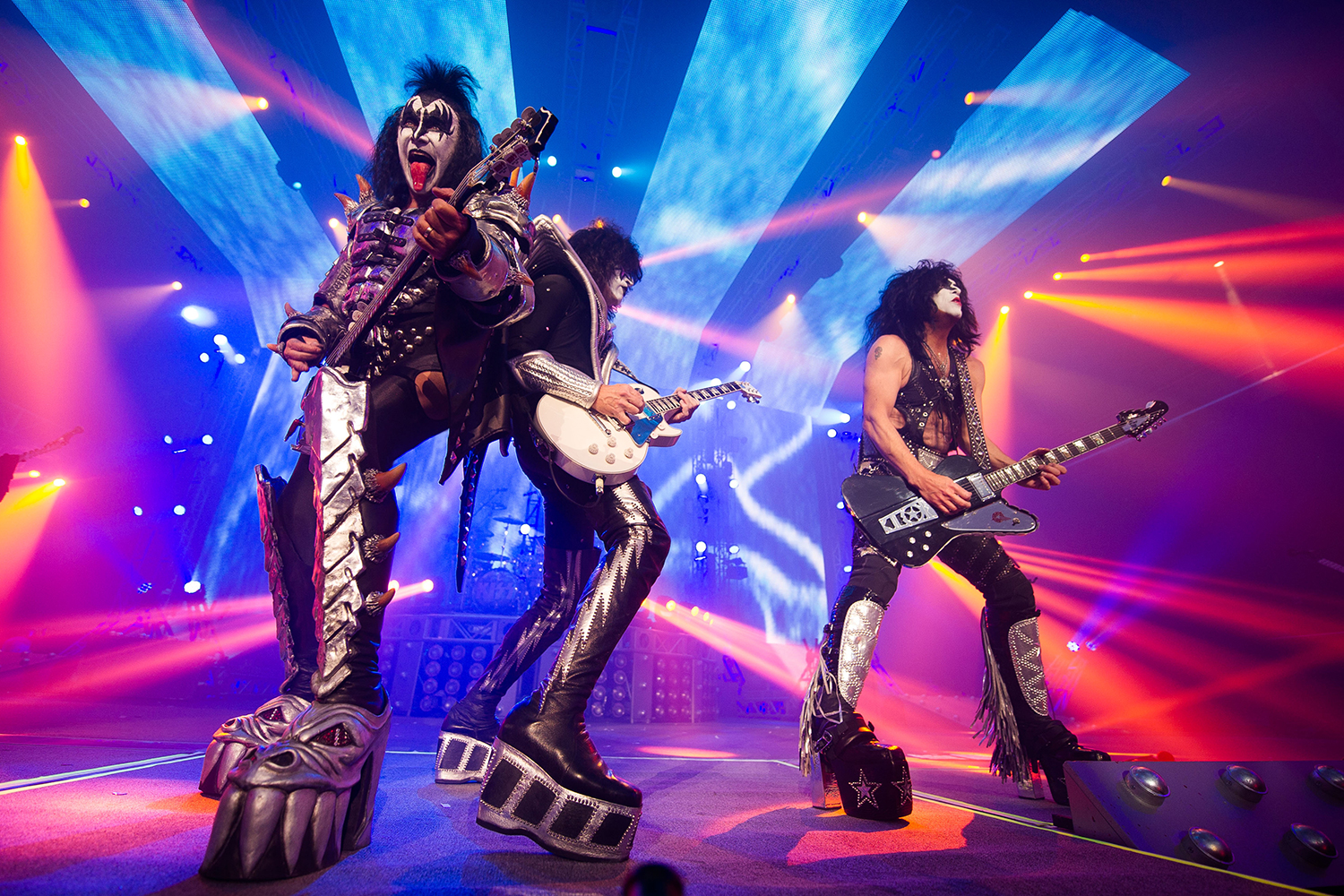
“KISS evolved into a tribe. It’s really about having a pivotal moment and a pivotal time in your life with us.”
It’s a battle cry any member of the KISS Army will instantly recognize. “You wanted the best, you got the best!” KISS has been unstoppable for over 40 years and counting, and they just upped their game yet again with KISS Rocks Vegas (out now in various formats via Eagle Vision), a live chronicle of the band’s incendiary residency at The Joint at the Hard Rock Hotel and Casino in Las Vegas in November 2014 in the midst of the band’s 40th Anniversary World Tour.
“Technology has advanced to the point now where you can really be fully enveloped by and in the center of the chaos that can be KISS from time to time,” frontman/vocalist/guitarist/eternal Starchild Paul Stanley told Digital Trends of the Dolby Atmos KISS Rocks Vegas experience.
Take it from me, the full-bore full-channel assault of KISS Rocks Vegas is most definitely best experienced via Blu-ray and the mega-multichannel Dolby Atmos option, so you can get the absolute complete effect of the set design, the band’s always mind-boggling pyrotechnics, and the glory of each KISS member’s chosen “armor.” Bassist/vocalist/The Demon himself, Gene Simmons, never fails to amaze with what he does and looks like onstage — especially the thunder of songs like Detroit Rock City, Lick It Up, and Black Diamond. An additional KISS Acoustic set featuring stripped-down favorites like Christine Sixteen, Hard Luck Woman, and Beth also show what guitarist Tommy Thayer and drummer Eric Singer bring to the KISS backline.
You can enhance something with as many bombs and laser beams as you want, but a crap song is a crap song.
Want another opinion? Take it from Micki Free, the mixed-blood Cherokee/Comanche Native American guitarist/vocalist discovered by Simmons and Stanley in the ’70s who went on to play guitar with Shalamar and glam-punkers Crown of Thorns: “I knew them both really well. Those guys were my mentors in the ’70s, when I was growing up,” Free recalled. “KISS was my favorite band as a boy, you know? Paul Stanley is such a great performer, too — I aspired to dance like he did onstage. He was that guy. I wanted to play guitar like Hendrix, and dance like Paul Stanley.”
Stanley called Digital Trends right before heading directly to the band’s recent gig in Bridgeport, Connecticut to discuss why KISS Rocks Vegas totally rocks in Dolby Atmos, what he feels the vinyl format is lacking, and what it was like working with original KISS Spaceman guitarist Ace Frehley again on his new solo album. Shout it, shout it, shout it out loud…
Digital Trends: I’ve been watching KISS Rocks Vegas on Blu-ray and in Dolby Atmos, so I think we have to modify a certain phrase of yours to, “You wanted the best, you got
Paul Stanley: Documenting that show with flying drones, Dolby Atmos, and everything else — it was a huge success for us. To do KISS Rocks Vegas in that way was something we couldn’t say no to — the idea of building a show that didn’t have to be transportable or taken down every night. We could basically do a stadium show in a small venue, because we brought it in piece by piece.
The visual presentation and the surround sound is just fantastic, and I especially enjoyed getting blown to bits by your classic guitar “destruction” at the end of the show. You must be really pleased with how it all turned out.
Oh, very pleased; very pleased. The band was great, the venue was great, and the show was great. Being able to really capture it in that way was very satisfying for all of us. I think it’s a great document, and a great testament, to who we are and what we are.
Having the KISS Acoustic set in there as a bonus, and getting to hear classic songs like Plaster Caster all stripped bare, just adds to the overall package.
Yeah. We wanted to do more than just have a concert, so to speak, so including our acoustic set, which we do every day before our electric show, is something like MTV Unplugged — people get to see what we are when you strip everything away.
Right, and if you don’t have good core songs to begin with, stripping them down in that way won’t get them across any better. Because KISS songwriting has been so strong for the past 40-plus years, these songs really come across acoustically.
I think so. You can enhance something with as many bombs and laser beams as you want, but a crap song is a crap song.
For those of us who put the needle to the groove on the Destroyer LP back in the day [1976], I can definitely say you have plenty of good songs to pull from. Would you say vinyl is your favorite listening method?
(slight pause) That’s an interesting one. I know people swear by vinyl. For me, what it has in warmth, it lacks in top end. It’s interesting for me, because I like a certain, I don’t want to say, strident top end to something — but I like more highs, perhaps, than most vinyl has. It certainly has more warmth, and I understand that. Me, I’d rather listen to vinyl, and then re-EQ it.
I really grew up in an era where, once we got into studios, we were listening on JBL 4311s [studio monitor speakers], L100s [studio monitor floor speakers], and Yamaha NS10s [studio monitors]. Those really became the benchmark and the standard for what I was comfortable listening to.
I was never somebody who was impressed with the “complete transparency” of music. I used to call those “Doctor Systems,” because somebody thought that was the way to go when, in fact, I like music to be somewhat colored.
In particular, I’ve always been a huge fan of the sound of JBL speakers with music, and that’s because, when I was in Electric Lady Studios as a teenager, that’s what I was listening to music on. [Stanley and Simmons hung out at Electric Lady Studios in New York City (which was built to the exacting specs of none other than Jimi Hendrix) in the early ’70s whenever they could, singing background vocals for the likes of Lyn Christopher until, in 1973, KISS cut a five-track demo at Electric Lady with Hendrix’s favorite producer, Eddie Kramer.]
I still have my 4311s and L100s that I bought in the ’70s. They’re reconditioned, and those are my listening speakers. I’ve got a cool McIntosh amp and preamp, and you can’t get better than that.
I’ve always loved that McIntosh blue glow. Do you have a favorite album or artist that you consider to be your “perfect” listening experience on that system?
I don’t believe most artists are getting what they deserve with streaming — they’re getting what they can.
Well, Steely Dan sounds pretty amazing. And obviously, Led Zeppelin and things like that are phenomenal. Zeppelin always, for me, stands the test of time, but Steely Dan — what you hear going on, on some of those tracks when you’re listening on a good system, is kind of mind-blowing. Something that was perhaps insinuated in the background, audiowise — suddenly, on a good system, you get what the instrument is that was playing.
A lot of modern listeners stream your music. Some KISS songs have well over 20 million listens on Spotify, like I Was Made for Loving You, Heaven’s on Fire, and Rock And Roll All Nite. What do you, as an artist, feel about streaming?
It’s a choice. It’s a convenience, for sure. And then it just comes down to, is the artist being paid? What happened when the internet got involved in music is that, initially — and to this day, in some ways — it was stolen property.
And it’s really not fair when an artist is making a deal based upon “take it or leave it.” I don’t believe that most artists are getting what they deserve; they’re getting what they can. And that’s ass-backwards. That’s the tail wagging the dog. When somebody is, in essence, saying, “I will do this with or without you” — well, you don’t have much to stand on, and that’s the unfairness. That’s the injustice of the internet.
I have to say I love the cover of Free’s Fire and Water you sang and played on with Ace Frehley on his Origins Vol. 1 solo album that came out earlier this year.
Thank you, thank you. I enjoyed doing it. It was great to connect with Ace in a positive way, and to reminisce and recall all the good stuff — and put aside all the other stuff.
I love the character in your voice these days. You’ve been very smart about how to take care of it over the years and adapt it to what you’re doing now, as opposed to chasing after what you did 40 years ago.
You know, your timbre changes and your range may change, and that is par for the course. It is ridiculous to go see an athlete 30 or 40 years on and say, “Gee, he doesn’t play like he once did.” Of course he doesn’t — he’s 30 or 40 years older! (laughs)
That being said, on this tour in particular, I’ve been very happy with my voice.
Is it fair to say that, 50 or more years from now when most of us are no longer on the planet, KISS songs like Love Gun and Rock and Roll All Nite are still going to be listened to by many generations to come? Do you feel KISS music is timeless music?
I do, I do! You only have to come to a concert to see that it has really evolved into a tribe, in that you have your neighbors, your younger siblings, and your grandparents there. It’s really about having a pivotal moment and a pivotal time in your life with us, and with all of those people.
I can attest to that, having seen one of your tours with Aerosmith [on November 16, 2003 at Madison Square Garden in New York] and feeling that communal experience with everyone there. It must be a great feeling to bring so many people and so many generations together, something that was probably just a dream when you guys started KISS back in the day.
I certainly had my eye on it. And the goal was to become a huge group. Because there was no precedent before that, the idea of playing for 15 years, 20 years, even 30 or 40 years — it was unfathomable and inconceivable, because it hadn’t happened before.
As music has progressed and continued, certain bands have been able to make it that long and go forward. It’s pretty astounding that KISS music has been embraced to a point where it has become classic.






